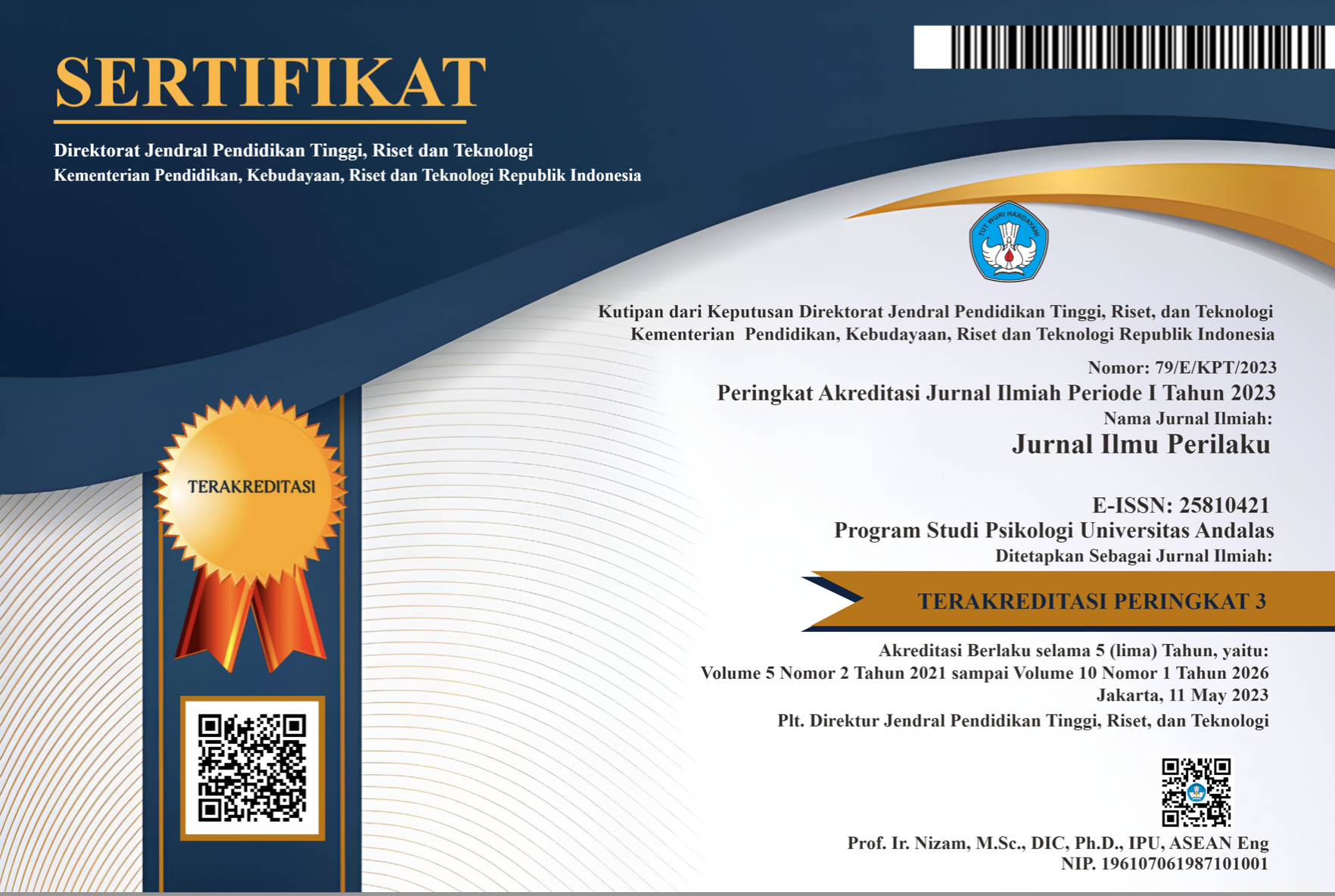Perception of Parental Love as a Predictor of Children's Life Satisfaction
Abstract
Love is a fundamental part of psychological well-adjustment, but a gap in the literature exists surrounding how perceptions of how loved adults felt by their biological parents in childhood can contribute to life satisfaction and psychological adjustment. This study aims to fill that gap by examining the impact of feeling loved by biological parents and grandparents on psychological well-being and adjustment factors later in life. 1,189 college-aged participants volunteered for the study and were recruited online via SONA at a university in the United States. We constructed a Likert-style rating scale to measure individuals’ level of perceived love (LUV) and its contribution to various adjustment indicators, including life satisfaction, depression, anxiety, trait anger, and conduct disturbance. Linear regression models and bivariate correlations were calculated for the predictor and maladjustment indicators. Results showed a modest correlation between the LUV index and life satisfaction as well as other maladjustment indicators and revealed that LUV significantly predicted life satisfaction. LUV was also a significant predictor of depression, anxiety, anger, and conduct disturbance. These results suggest that perceived love could be an important resilience factor and could be used to predict life satisfaction and psychological adjustment later in life.
Downloads
References
Archer, J., & Webb, I.A. (2006). The relation between scores on the Buss–Perry Aggression Questionnaire and aggressive acts, impulsiveness, competitiveness, dominance, and sexual jealousy. Aggressive Behavior, 32, 464–473. https://doi.org/10.1002/ab.20146
Buss, A. H., & Perry, M. (1992). The aggression questionnaire. Journal of Personality and Social Psychology, 63(3), 452–459. https://doi.org/10.1037/0022-3514.63.3.452
Buss, A. H., & Warren, W. L. (2000). Aggression Questionnaire Manual. Los Angeles, CA: Western Psychological Services.
Devries, K. M., Mak, J. Y., Child, J. C., Falder, G., Bacchus, L. J., Astbury, J., & Watts, C. H. (2014). Childhood sexual abuse and suicidal behavior: a meta-analysis. Pediatrics, 133(5), e1331-e1344. https://doi.org/10.1542/peds.2013-2166
Diener, E., Emmons, R. A., Larsen, R. J., & Griffin, S. (1985). The Satisfaction with Life Scale. Journal of Personality Assessment, 49(1), 71–75. https://doi.org/10.1207/s15327752jpa4901_13
Dube, S. R., Anda, R. F., Felitti, V. J., Chapman, D. P., Williamson, D. F., & Giles, W. H. (2001). Childhood abuse, household dysfunction and the risk of attempted suicide throughout the life span: Findings from the Adverse Childhood Experiences Study. Journal of the American Medical Association, 286, 3089–3096. https://doi.org/10.1001/jama.286.24.3089
Fergusson, D. M., Boden, J. M., & Horwood, L. J. (2008). Exposure to childhood sexual and physical abuse and adjustment in early adulthood. Child Abuse & Neglect, 32(6), 607-619. https://doi.org/10.1016/j.chiabu.2006.12.018
Finkelhor, D., Ormrod, R. K., & Turner, H. A. (2007). Polyvictimization and trauma in a national longitudinal cohort. Development and Psychopathology, 19, 149–166. https://doi.org/10.1017/S0954579407070083
Finkelhor, D., Ormrod, R., Turner, H., & Holt, M. (2009). Pathways to poly-victimization. Child Maltreatment, 14, 316–329. https://doi.org/10.1177/1077559519859080
Gerevich, J., Bacskai, E., & Czobor, P. (2007). The generalizability of the Buss-Perry Aggression Questionnaire. International Journal of Methods of Psychiatric Research, 16(3), 124-136. https://doi.org/10.1002/mpr.221
Giotsa, A., Kyriazos, T., & Mitrogiorgou, E. (2018). Parental acceptance-rejection and interpersonal anxiety in young adults. Hellenic Journal of Psychology, 15, 138-150.
Green, J.S., & King, A.R. (2009). Domestic violence and parental divorce as predictors of best friendship qualities among college students. Journal of Divorce & Remarriage, 50(2), 100-118. https://doi.org/10.1080/10502550802365805
Ildiz, G. I., & Ayhan, A. B. (2022). A study of predictive role of parental acceptance rejection perceived by children on secure attachment level. Current Psychology, 41, 3741-3750. https://doi.org/10.1007/s12144-020-00897-9
Jones, J. W. (1983). The children of alcoholics screening test: A validity study. Bulletin of the Society of Psychologists in Addictive Behaviors, 2(3), 155–163.
Khaleque, A., Uddin, m. K., Hossain, K. N., Siddique, N., Shirin, A. (2019). Perceived parental acceptance-rejection in childhood predict psychological adjustment and rejection sensitivity in adulthood. Psychological Studies, 64(4), 447-454. https://doi.org/10.1007/s12646-019-00508-z
King, A. (2014a). Violent Experiences Questionnaire predictors of low base-rate aggressive acts. Journal of Aggression, Maltreatment & Trauma, 23(8), 804-822. https://doi.org/10.1080/10926771.2014.940480
King, A. R. (2014b). Childhood physical abuse and sociopathy: is this link magnified among firstborn children? Journal of Aggression, Maltreatment & Trauma, 23(9), 963-981. https://doi.org/10.1080/10926771.2014.953718
King, A. R. (2016). Peer first impressions of childhood maltreatment victims. Journal of Aggression, Maltreatment & Trauma, 25(2), 164-179. https://doi.org/10.1080/10926771.2016.1121188
King, A.R. (2020a). PID-5 trait indicators of emotional instability and childhood adversity antecedents. Psychological Reports, 125(1), 310-327. https://doi.org/10.1177/0033294120973940
King, A.R. (2020b). The ACE Questionnaire and lifetime physical aggression. Journal of Aggression, Maltreatment & Trauma, 30(2), 243-260. https://doi.org/10.1080/10926771.2020.1796875
King, A. R. (2021). Childhood adversity links to self-reported mood, anxiety, and stress-related disorders. Journal of Affective Disorders, 292, 623-632. https://doi.org/10.1016/j.jad.2021.05.112
King, A.R., Auen, A.J., & Russell, T.D. (2019). Childhood maltreatment and adult dispositional mindfulness. In S. Aideen Xu (Ed.), Violence exposure: Perspectives, gender differences and outcomes (pp. 55-78). Nova Science Publishers, Inc.
King, A.R., Ratzak, A., Ballantyne, S., Knutson, S., Russell, T.D., Pogalz, C.R., & Breen, C.M. (2018). Differentiating corporal punishment from physical abuse in the prediction of lifetime aggression. Aggressive Behavior, 44(3), 306-315. https://doi.org/10.1002/ab.21753
King, A. R., & Russel, T. D. (2017). Psychometric properties of the Violent Experiences Questionnaire. Child Abuse & Neglect, 67, 64-75. http://dx.doi.org/10.1016/j.chiabu.2017.02.008
King, A.R., Russell, T.D., & Bailly, M.D. (2017). Psychometric properties of the Lifetime Acts of Violence Assessment. Violence and Victims, 32(6), 998-1013. http://dx.doi.org/10.1891/0886-6708.VV-D-16-00067
Kitzmann, K. M., Gaylord, N. K., Holt, A. R., & Kenny, E. D. (2003). Child witnesses to domestic violence: a meta-analytic review. Journal of Consulting and Clinical Psychology, 71(2), 339. https://doi.org/10.1037/0022-006X.71.2.339
Lehman, B. J., Taylor, S. E., Kiefe, C. I., & Seeman, T. E. (2009). Relationship of early life stress and psychological functioning to blood pressure in the CARDIA study. Health Psychology, 28(3), 338–346. https://doi.org/10.1037/a0013785
Li, X., & Meier, J. (2017). Father love and mother love: Contributions of parental acceptance to children’s psychological adjustment. Journal of Family Theory & Review, 9, 459-490. https://doi.org/10.1111/jftr.12227
Mangold, A., & King, A.R. (2020). Relationships between experiences of sibling physical abuse and lifetime aggression using statistical controls for poly-victimization. Journal of Family Violence, 36(2), 235-247. https://doi.org/10.1007/s10896-020-00134-8
Maximo, S. I., & Carranza, J. S. (2016). Parental attachment and love language as determinants of resilience among graduating university students. SAGE Open, 6(1), 1-11. https://doi.org/10.1177/2158244015622800
Moe, B. K., King, A. R., & Bailly, M. D. (2004). Retrospective accounts of recurrent parental physical abuse as a predictor of adult laboratory-induced aggression. Aggressive Behavior, 30(3), 217–228. https://doi.org/10.1002/ab.20019
Moran, K. M., Turiano, N. A., & Gentzler, A. L. (2018). Parental warmth during childhood predicts coping and well-being in adulthood. Journal of Family Psychology, 32(5), 610-621. https://doi.org/10.1037/fam0000401
Mugge, J. R., Chase, S. L., & King, A. R. (2015). Child peer abuse and perceptions of executive-functioning competencies. Applied Neuropsychology: Child, 5(1), 67-75. https://doi.org/10.1080/21622965.2014.986327
Mugge, J.R., King, A.R., & Klophaus, V. (2009). The quality of young adult best friendships after exposure to childhood physical abuse, domestic violence or parental alcoholism. In F. Columbus (Ed.), Friendships: Types, cultural variations, and psychological and social aspects. Nova Science Publishers, Inc.
Pavot, W. G., Diener, E., Colvin, C. R., & Sandvik, E. (1991). Further validation of the Satisfaction With Life Scale: Evidence for the cross-method convergence of well-being measures. Journal of Personality Assessment, 57(1), 149–161. https://doi.org/10.1207/s15327752jpa5701_17
Pavot, W., & Diener, E. (1993). Review of the Satisfaction With Life Scale. Psychological Assessment, 5(2), 164–172. https://doi.org/10.1037/1040-3590.5.2.164
Pavot, W., & Diener, E. (2008). The Satisfaction With Life Scale and the emerging construct of life satisfaction. The Journal of Positive Psychology, 3(2), 137–152. https://doi.org/10.1080/17439760701756946
Rohner, R. P. (1986). The warmth dimension: Foundations of parental acceptance-rejection theory. Sage.
Rohner, R. P. (2005). Parental acceptance-rejection questionnaire (PARQ): Test manual. In R. P. Rohner & A. Khaleque (Eds.), Handbook for the study of parental acceptance and rejection (4th ed., pp. 43–106). Rohner Research Publications.
Rohner, R. P., Kaleque, A., & Cournoyer, D. E. (2005). Parental acceptance-rejection: Theory, methods, cross-cultural evidence, and implications. ETHOS, 33(3), 299-334.
Russek, L. G., Schwartz, G. E., Bell, I. R., & Baldwin, C. M. (1998). Positive perceptions of parental caring are associated with reduced psychiatric and somatic symptoms. Psychosomatic Medicine, 60(5), 654-657. https://doi.org/10.1097/00006842-199809000-00024
Russell, T. D., Veith A., King, A. R. (2015). Childhood maltreatment predictors of trait impulsivity. In Alesandra M.C (Ed.). Advances in psychology research (pp.33-56). Nova Science Publishers, Inc.
Sillick, T. J., & Schutte, N. S. (2006). Emotional intelligence and self-esteem mediate between perceived early parental love and adult happiness. E-Journal of Applied Psychology: Emotional Intelligence, 2(2): 38-48.
Surijah, E. A., Rahayu, K. D. A., & Supriyadi. (2020). The capacity of feeling loved predicted life satisfaction and positive affect in married individuals. Jurnal Ilmu Perilaku, 4(1), 1-19. https://doi.org/10.25077/jip.4.1.1-19.2020
Trumpeter, N. N., Watson, P. J., O’Leary, B. J., & Weathington, B. L. (2008). Self-functioning and perceived parenting: Relations of parental empathy and love inconsistency with narcissism, depression, and self-esteem. The Journal of Genetic Psychology, 169(1), 51-71. https://doi.org/10.3200/GNTP.169.1.51-71
United States Census Bureau (2018). U.S. Department of Commerce. www.census.gov/quickfacts/fact/table/US/PST045218
van der Feltz-Cornelis, C. M., Potters, E. C., van Dam, A., Koorndijk, R. P., & Elfeddali, I. (2019). Adverse Childhood Experiences (ACE) in outpatients with anxiety and depressive disorders and their association with psychiatric and somatic comorbidity and revictimization. Cross-sectional observational study. Journal of Affective Disorders, 246, 458–464. https://doi.org/10.1016/j.jad.2018.12.096
Veith, A.C., Russell, T.D., & King, A.R. (2017). PID-5 trait mediation of childhood maltreatment effects. Personality and Individual Differences, 104, 56-63. https://doi.org/10.1016/j.paid.2016.07.024
Voith, L. A., Anderson, R. E., & Cahill, S. P. (2020). Extending the ACEs framework: Examining the relations between childhood abuse and later victimization and perpetration with college men. Journal of Interpersonal Violence, 35(7-18), 3487-3512. https://doi.org/10.1177/0886260517708406
Walter, N., & King, A. R. (2013). Childhood physical abuse and mindfulness as predictors of young adult friendship maintenance difficulty. In C. Mohiyeddini (Ed.). Emotional relationships: Types, challenges and Physical/Mental health impacts. Hauppauge, NY: Nova Science Publishers, Inc.
Yasmin, S., & Hossain, A. (2014). Relation of parental rejection with self-esteem and life satisfaction of young adults. Dhaka University Journal of Biological Sciences, 23(1), 69–76. https://doi.org/10.3329/dujbs.v23i1.19828
Zimmermann, J. J., Eisemann, M. R., & Fleck, M. P. (2008). Is parental rearing an associated factor of quality of life in adulthood? Quality of Life Research, 17(2), 249–255. https://doi.org/10.1007/s11136-007-9261-x
The non-commercial use of the article is governed by the Creative Commons Attribution license as currently displayed on Creative Commons Attribution-NonCommercial-ShareAlike 4.0 International License.
JIP's spirit is to disseminate articles published are as free as possible. Under the Creative Commons license, JIP permits users to copy, distribute, display, and perform the work for non-commercial purposes only. Users will also need to attribute authors and JIP on distributing works in the journal.
Please find the rights and licenses in Jurnal Ilmu Perilaku (JIP).
- License
The non-commercial use of the article will be governed by the Creative Commons Attribution license as currently displayed on Creative Commons Attribution-NonCommercial-ShareAlike 4.0 International License.
- Author’s Warranties
The author warrants that the article is original, written by stated author(s), has not been published before, contains no unlawful statements, does not infringe the rights of others, is subject to copyright that is vested exclusively in the author and free of any third party rights, and that any necessary written permissions to quote from other sources have been obtained by the author(s).
- User Rights
JIP's spirit is to disseminate articles published are as free as possible. Under the Creative Commons license, JIP permits users to copy, distribute, display, and perform the work for non-commercial purposes only. Users will also need to attribute authors and JIP on distributing works in the journal.
- Rights of Authors
Authors retain the following rights:
- Copyright, and other proprietary rights relating to the article, such as patent rights,
- The right to use the substance of the article in future own works, including lectures and books,
- The right to reproduce the article for own purposes, provided the copies are not offered for sale,
- The right to self-archive the article.
- Co-Authorship
If the article was jointly prepared by other authors, the signatory of this form warrants that he/she has been authorized by all co-authors to sign this agreement on their behalf, and agrees to inform his/her co-authors of the terms of this agreement.
- Termination
This agreement can be terminated by the author or JIP upon two months’ notice where the other party has materially breached this agreement and failed to remedy such breach within a month of being given the terminating party’s notice requesting such breach to be remedied. No breach or violation of this agreement will cause this agreement or any license granted in it to terminate automatically or affect the definition of JIP.
- Royalties
This agreement entitles the author to no royalties or other fees. To such extent as legally permissible, the author waives his or her right to collect royalties relative to the article in respect of any use of the article by JIP or its sublicensee.
- Miscellaneous
JIP will publish the article (or have it published) in the journal if the article’s editorial process is successfully completed and JIP or its sublicensee has become obligated to have the article published. JIP may conform the article to a style of punctuation, spelling, capitalization, referencing and usage that it deems appropriate. The author acknowledges that the article may be published so that it will be publicly accessible and such access will be free of charge for the readers.










